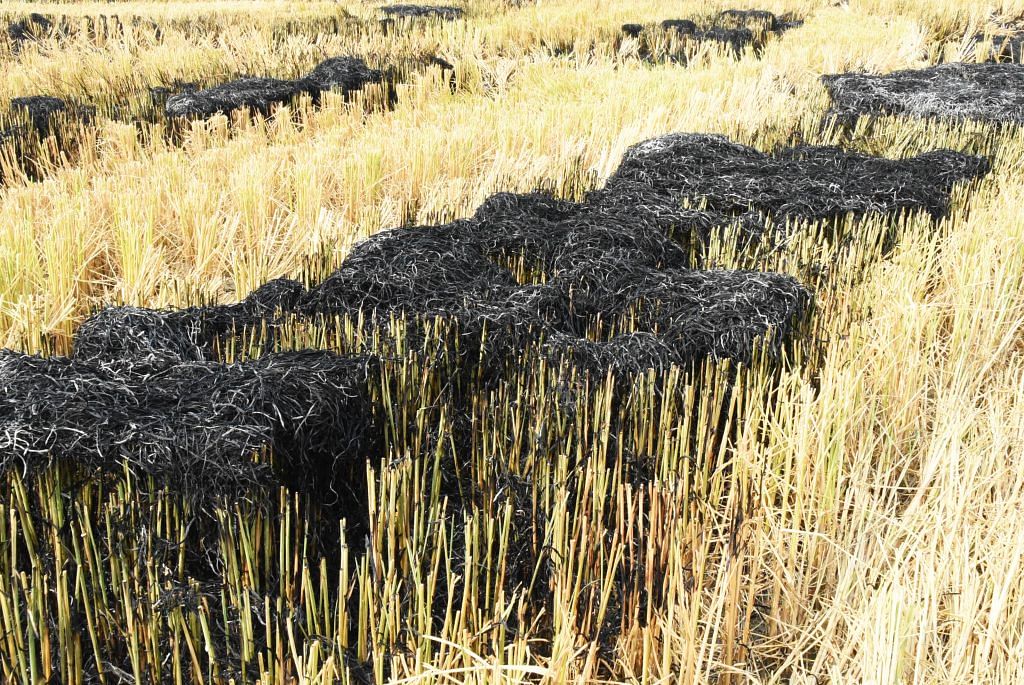The central government’s policy of not allowing Punjab to diversify is causing damage to the health of people in faraway Delhi.
Crop stubble burning is a nuisance for both humans and the ecosystem as a whole. And the farmer needs a systematic support system to tide over the problem.
The support can come in many ways: central government policy intervention being the most important. Through its current policy, the central government is not allowing the diversification of crops in Punjab.
On the one side, the government is saying farmers need to diversify into other crops, away from paddy, and on the other side, there is an old notification that hinders diversification. Even the Punjab government wants to move away from paddy because it is water consuming, and is drying up underground aquifers at an alarming rate.
There is an urgent need to diversify and one alternative is to immediately replace some area with maize. The government must start procuring maize at a competitive value so it is beneficial for farmers to shift, or the other way is to allow market forces to work.
The government does not allow ethanol production from full grains. It allows for ethanol from sugarcane, and just a few days ago, the government even raised the price by 5 per cent, to Rs 40.85 per litre. If the government allows production of ethanol from maize, many paddy farmers may shift to maize cultivation. This would lead to sizeable diversification as it will be comparatively profitable to switch from paddy. It would also reduce that much area from crop burning because it would reduce that much quantity of straw.
The government of India feels that shifting from paddy could hit food security situation. But in-spite of two continuous years of drought, India is a cereal-surplus nation. The change will not affect food security, the thinking needs to change with the times.
The National Green Tribunal must give directions to the central government to allow conversion of maize to ethanol.
The turnaround time between harvesting and sowing is very little, and because of that farmers find it cheaper, quicker and easier to burn, enabling them to plant the next crop — wheat — in time. A delay in sowing will reduce the wheat yield. How do we solve this turnaround time? Farmers can use expensive equipment to incorporate or mulch the straw left on the ground after the grain has been harvested.
Farmers are burning the straw because the excess paddy cultivation results in excess paddy straw. Wheat straw is better than paddy straw for digestion among animals and because sufficient wheat straw is available, there is limited demand for paddy straw. Additionally, paddy straw has a higher silica and unsuitable for boiler use.
One way is to collect paddy straw for composting or making bales out of it. Allowing MNREGA labourers to be used to collect the straw in a short window of 20-25 days will help. Another is to use a combination of the Super Straw Management System (Super SMS) to shred and spread the straw once it comes out of the combine harvester and thereafter use a happy seeder (which has been around for over 10 years) for sowing.
Mechanical means of incorporating or mulching the paddy straw increases the cost of harvest and cultivation cost rises substantially. To offset the expenses, NGT must also direct the central government to give financial incentive of Rs 100 per quintal of paddy to only those farmers who agree not to burn the straw. The farmer is already too stressed and ownership of farm machinery is also a reason for Punjab farmers’ debt and leading to suicides. Therefore, Rs 1,100 crore is required to make the machines available to farmers.
The whole approach of penalising farmers is wrong; the focus should be on incentivising farmers to not burn. Positive thinking is better than a negative approach. It’s a subject of behavioural economics to design a mindset change and changing practices, not one designed by a judicial or by a bureaucratic approach.
All through the Green Revolution era and until now, we have been taught by the system to clean our fields before sowing. Now farmers are being told ‘don’t clean your farm’. It requires a huge mindset change. It is like someone telling you to run bare-feet after you have been running in shoes all your life. You cannot bring about mindset change by just fining people. You have to make concerted effort to provide alternatives and create awareness. It will take 5-10 years to change.
Punjab is also announcing the Paddy Straw Challenge Fund to award $1 million to anyone who provides the technology that will help decompose paddy straw in an ecological way without lifting it, on site within 15 days. For example, if someone can innovate a way of spraying bio enzymes or likewise to decompose the straw, without impacting the yield in any adverse manner. We need a multi-pronged approach to bring about behaviour change.
But the buck stops with the central government. Farmers in Punjab are being used as scapegoats to ensure India’s food security and now we are being held responsible for our methods. A little help from the central government can change the ground realities not only in Punjab but in Delhi too.
The prevailing policies are causing damage to the health of people in faraway Delhi. But it is not about heaping blame. If smoke from burning crops impacts lungs in Delhi for three weeks, then exhaust from vehicles in Delhi adversely impacts the countryside for 365 days. It is like living next to a chain smoker. Folks, stop the blame game, let’s work together on the solutions.
The author, the chairman, Punjab State Farmers’ Commission, spoke to ThePrint. Views are personal.
